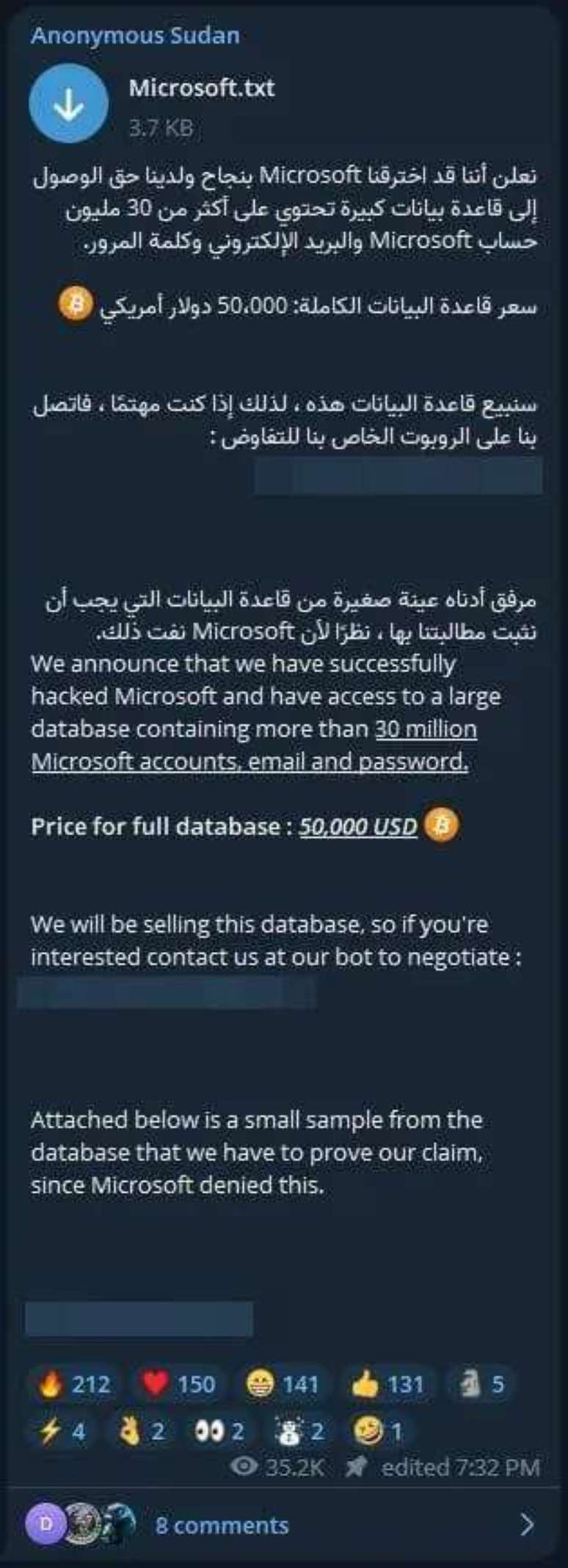The group responsible for Microsoft’s outage in June said it had stolen data from 30 million accounts; company has denied leaking
The information of 30 million users of the services of Microsoft may be in the hands of the Anonymous Sudan cybercriminal group, which hit the company’s platforms in early June. Microsoft has denied any compromise of its systems, while a group publication closed on telegram announces the sale of profile access credentials.
- Security shouldn’t be about fear, it’s about hope, says the Microsoft executive
- Microsoft will encourage technical students to become ‘good hackers’
The post published this Monday (3) talks about the alleged obtaining of emails and passwords to access Microsoft accounts, which would have been compromised after an attack on the company’s database. Anonymous Sudan wants to sell the volume for US$50,000 in Bitcoin, approximately R$241,000, and is asking interested parties to contact them directly so the deal can go through.
As proof, the group of cybercriminals has released a sample with 100 pairs of credentials, with accounts that would give access to cloud services or personal data of Microsoft users. However, it was not possible to verify the validity of the volume, with information possibly belonging to other previous leaks, from platforms not connected to the Redmond giant.

“We announce that we have successfully breached Microsoft and have access to a large database containing over 30 million Microsoft accounts, emails and passwords.
We are selling this database so if you are interested please contact our bot for a deal. Attached below is a small sample of the database we have to prove our claim, as Microsoft has denied it.”
In an official response, Microsoft denied the data leak. The company said it found no evidence that its internal systems had been compromised, while an analysis indicated that the claim that the information it posted belonged to its users would be illegitimate, as was the collection of information the gang claims to have .
The Denial of Service attack took Office, OneDrive, Azure and others offline

Microsoft’s denial, incidentally, had already been given previously. In mid-June, the company said there were no signs of an intrusion into its internal systems following a DDoS attack launched by Anonymous Sudan against its systemsin the first days of the month. The confirmation, however, came only after days of interruptions and access difficulties for its users.
Platforms like Office 365, Azure, and OneDrive started experiencing problems on June 7, with a denial of service scam by networks of zombie devices, cloud computing tools, and compromised servers. Microsoft didn’t provide technical details on the volume of data trafficked or the duration of the attacks, saying only that they started with Outlook and spread to other resources over the next two days.
Meanwhile, the Anonymous Sudan group had already claimed responsibility for the attack. Going by the name Storm-1359 and with alleged links to the Russian government’s digital warfare operations, the gang allegedly waged the offensive in retaliation for the US government’s interference in the country’s internal affairs. In addition to Microsoft, shipping company UPS has also been hit by DDoS attacks, with customers blocked from accessing package tracking tools due to the high volume of requests.
Source: Computer that plays
Trending on Canaltech:
- 1st drug for new teeth to be tested on humans
- 6 advantages and disadvantages of buying a Xiaomi mobile
- The new Cyclops costume confirms that the hero has turned into a villain
- Marvel Comics has officially made the Hulk into a god
- Iron Man hires a “surrogate” with armor made from household junk
- You can now sync Google Maps to your phone with Android Auto
Source: Terra
Rose James is a Gossipify movie and series reviewer known for her in-depth analysis and unique perspective on the latest releases. With a background in film studies, she provides engaging and informative reviews, and keeps readers up to date with industry trends and emerging talents.


![It All Begins Here: What’s in store for Tuesday 21 October 2025 Episode 1289 [SPOILERS] It All Begins Here: What’s in store for Tuesday 21 October 2025 Episode 1289 [SPOILERS]](https://fr.web.img3.acsta.net/img/99/48/99481db5c03e1ff295fce95b23125991.jpg)




